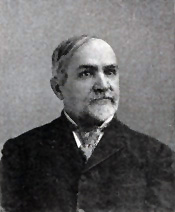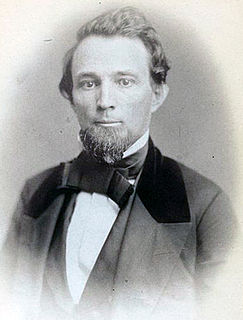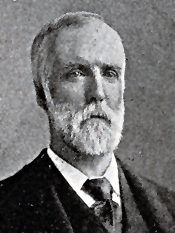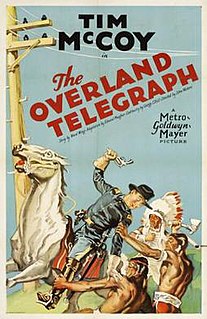This page is based on this
Wikipedia article Text is available under the
CC BY-SA 4.0 license; additional terms may apply.
Images, videos and audio are available under their respective licenses.

Three successive designs served as the official national flag of the Confederate States of America during its existence from 1861 to 1865.

Randall Thomas Davidson, 1st Baron Davidson of Lambeth, was an Anglican bishop of Scottish origin who served as Archbishop of Canterbury from 1903 to 1928. Adrian Hastings said he was perhaps the most influential of the churchmen, because he was:

The Confederate States Congress was both the provisional and permanent legislative assembly of the Confederate States of America that existed from 1861 to 1865. Its actions were for the most part concerned with measures to establish a new national government for the Southern "revolution", and to prosecute a war that had to be sustained throughout the existence of the Confederacy. At first, it met as a provisional congress both in Montgomery, Alabama and Richmond, Virginia.

The 1st Confederate States Congress, consisting of the Confederate States Senate and the Confederate States House of Representatives, met from February 18, 1862, to February 17, 1864, during the first two years of Jefferson Davis's presidency, at the Virginia State Capitol in Richmond, Virginia.

John Letcher was an American lawyer, journalist, and politician. He served as a Representative in the United States Congress, was the 34th Governor of Virginia during the American Civil War, and later served in the Virginia General Assembly. He was also active on the Board of Visitors of Virginia Military Institute.

The 5th Congressional District of Tennessee is a congressional district in Middle Tennessee. It has been represented by Democrat Jim Cooper since January 2003.

The American Civil War was the first in which large armies depended heavily on railroads to bring supplies. For the Confederate States Army, the system was fragile and was designed for short hauls of cotton to the nearest river or ocean port. During the war, new parts were hard to obtain, and the system deteriorated from overuse, lack of maintenance, and systematic destruction by Union raiders.

Henry Cornelius Burnett was an American politician who served as a Confederate States Senator from Kentucky from 1862 to 1865. From 1855 to 1861, Burnett served four terms in the United States House of Representatives. A lawyer by profession, Burnett had held only one public office—circuit court clerk—before being elected to Congress. He represented Kentucky's 1st congressional district immediately prior to the Civil War. This district contained the entire Jackson Purchase region of the state, which was more sympathetic to the Confederate cause than any other area of Kentucky. Burnett promised the voters of his district that he would have President Abraham Lincoln arraigned for treason. Unionist newspaper editor George D. Prentice described Burnett as "a big, burly, loud-mouthed fellow who is forever raising points of order and objections, to embarrass the Republicans in the House".

Allen Taylor Caperton was an American politician who was a United States Senator from the State of West Virginia in 1875–1876. He was a member of the Democratic Party. He had served in the Virginia House of Delegates and Virginia State Senate before the American Civil War. During the Civil War, he served as a Confederate States Senator.
Josiah Abigail Patterson Campbell was an American politician who served as a Deputy from Mississippi to the Provisional Congress of the Confederate States from 1861 to 1862.

Benjamin Sterling Turner was an American businessman and politician who served in the United States House of Representatives representing Alabama's 1st congressional district in the 42nd United States Congress.
John Allen Wilcox was a politician from Mississippi and Texas who served in the United States House of Representatives in the early 1850s and then in the Confederate Congress during the American Civil War.

Henry Gray Turner was an American politician, teacher, jurist and soldier. The Henry Gray Turner House in Quitman, Georgia is listed on the National Register of Historic Places.

Robert Hamilton McWhorta Davidson was a U.S. Representative from Florida.

John Milton Sandidge was a U.S. Representative from Louisiana.

Smith Spangler Turner was a U.S. Representative from Virginia.

The Overland Telegraph is a 1929 American Western silent film directed by John Waters and written by Harry Sinclair Drago, George C. Hull and Edward J. Meagher. The film stars Tim McCoy, Dorothy Janis, Frank Rice, Lawford Davidson, Clarence Geldart and Chief John Big Tree. The film was released on March 2, 1929, by Metro-Goldwyn-Mayer.
Running Water is a 1922 British silent drama film directed by Maurice Elvey and starring Madge Stuart, Lawford Davidson and Julian Royce. The film is an adaptation of A.E.W. Mason's 1906 novel Running Water.

The 2016 United States House of Representatives elections in Ohio were held on November 8, 2016, to elect the 16 U.S. Representatives from the state of Ohio, one from each of the state's 16 congressional districts. The elections coincided with the 2016 U.S. presidential election, as well as other elections to the House of Representatives, elections to the United States Senate and various state and local elections. The primaries were held on March 15.
















